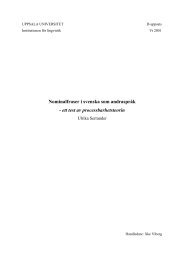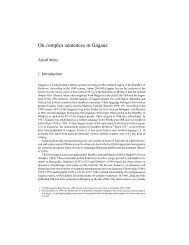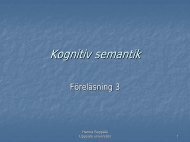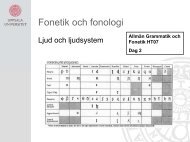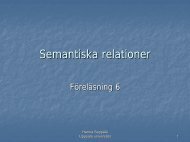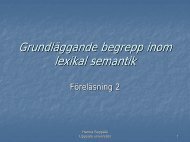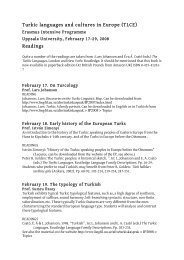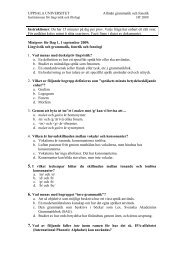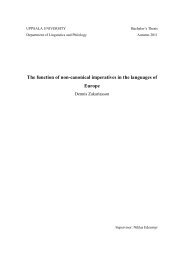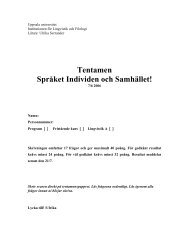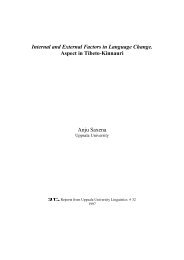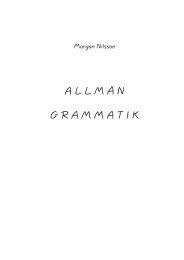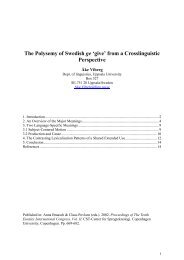Preaspiration in the Nordic Languages: Synchronic and Diachronic ...
Preaspiration in the Nordic Languages: Synchronic and Diachronic ...
Preaspiration in the Nordic Languages: Synchronic and Diachronic ...
You also want an ePaper? Increase the reach of your titles
YUMPU automatically turns print PDFs into web optimized ePapers that Google loves.
Some Icel<strong>and</strong>ic l<strong>in</strong>guists seem to have modelled <strong>the</strong>ir ON stop<br />
“ideal” on <strong>the</strong> Nor<strong>the</strong>rn Icel<strong>and</strong>ic dialect, ra<strong>the</strong>r than on Norwegian or<br />
Swedish—or Sou<strong>the</strong>rn Icel<strong>and</strong>ic, for that matter. This can be deduced<br />
from <strong>the</strong> tendency to view <strong>the</strong> Nor<strong>the</strong>rn Icel<strong>and</strong>ic dialect as more “orig<strong>in</strong>al”<br />
than <strong>the</strong> Sou<strong>the</strong>rn dialect (Böðvarsson 1951, Árnason 1986). Unlike<br />
Norwegian <strong>and</strong> Swedish, <strong>the</strong> Nor<strong>the</strong>rn Icel<strong>and</strong>ic dialect has “true” postaspiration<br />
<strong>in</strong> its word-medial s<strong>in</strong>gleton fortis stops, although <strong>the</strong> gem<strong>in</strong>ates<br />
are preaspirated. Thus, <strong>the</strong> ON orthographic representation appears<br />
to be better matched by <strong>the</strong> phonetic “surface forms” of Nor<strong>the</strong>rn Icel<strong>and</strong>ic<br />
than, for example, Sou<strong>the</strong>rn Icel<strong>and</strong>ic.<br />
We now have evidence of dialects with even “purer” postaspiration<br />
than Nor<strong>the</strong>rn Icel<strong>and</strong>ic. In <strong>the</strong> Western Ål<strong>and</strong> dialect all ON fortis stops,<br />
even <strong>the</strong> word-medial gem<strong>in</strong>ates, are reflected as postaspirated (cf. Ch. 4,<br />
section 4.5.3). This is apparently also <strong>the</strong> case <strong>in</strong> <strong>the</strong> areas of Bjerkreim<br />
<strong>and</strong> Dalane <strong>in</strong> South-western Norway (cf. Ch. 4, section 4.5.2). One<br />
could argue that <strong>the</strong>se dialects preserve <strong>the</strong> orig<strong>in</strong>al ON pronunciation,<br />
postaspirated fortis stops that are free of any preaspiration.<br />
The problem with this idea is: If ON had normative postaspiration on<br />
all stops, <strong>in</strong>itial <strong>and</strong> medial, <strong>the</strong>n why are such stops so rare <strong>in</strong> Sc<strong>and</strong><strong>in</strong>avia<br />
today? In <strong>the</strong> <strong>Nordic</strong> languages, normative word-medial postaspiration<br />
is known only <strong>in</strong> three relatively small areas. In fact, areas<br />
with normative preaspiration outnumber <strong>the</strong> areas with normative postaspiration.<br />
In <strong>the</strong> rema<strong>in</strong>der of Sc<strong>and</strong><strong>in</strong>avia, <strong>the</strong> tendency for nonnormative<br />
preaspiration seems much stronger than <strong>the</strong> tendency for postaspiration.<br />
From a typological perspective, it seems counter-<strong>in</strong>tuitive that<br />
<strong>the</strong> relatively unmarked feature of postaspiration has almost entirely<br />
given way to <strong>the</strong> very marked feature of preaspiration, even if this preaspiration<br />
is non-normative.<br />
While this issue, as such, has not been considered previously, objections<br />
have still been raised, on completely different grounds, aga<strong>in</strong>st <strong>the</strong><br />
portrayal of <strong>the</strong> ON stop system as contrast<strong>in</strong>g postaspirated vs. voiced<br />
stops. Chapman (1962) observed that <strong>the</strong> geographical distribution of<br />
Sw. terräng ‘terra<strong>in</strong>,’ even though <strong>the</strong> stress is on <strong>the</strong> second syllable, <strong>the</strong> word-<strong>in</strong>itial<br />
stop is still aspirated. Likewise, <strong>in</strong> a word like metall ‘metal,’ also with <strong>the</strong> stress on<br />
<strong>the</strong> second syllable, <strong>the</strong> stop is postaspirated even though it is not word-<strong>in</strong>itial.<br />
– 218 –



